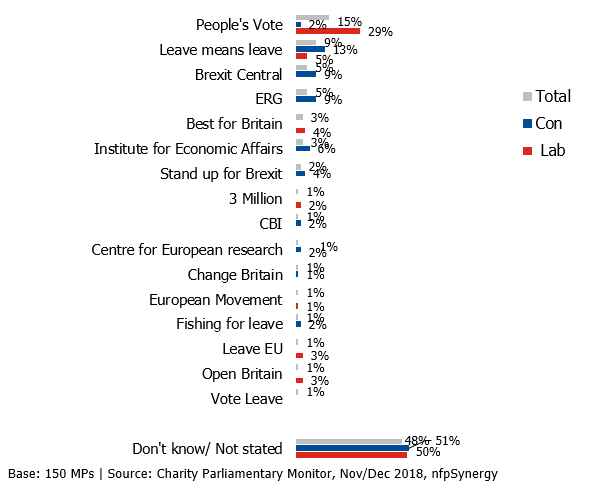Oliver White
This introduction could tell you, in some long prose, that Brexit is a divisive issue and that engaging with politicians on it is likely to result in accusations of bias… I don’t really feel the need.
nfpSynergy research with MPs has revealed some insights on how charities should engage with politicians on areas affected by Brexit. Namely, that if charities campaign on Brexit attention must be given to being as specific as possible on the changing regulatory and financial environment that will result from leaving the EU. Furthermore, that any attempt to influence MPs needs to be tailored to individual parties and further.
However, the question of whether a charity should campaign on Brexit must always be examined rigorously. Charities are not associated with this policy area and are likely to face opposition to their involvement from MPs.
The Charity sector and Brexit
We asked MPs in our Charity Parliamentary Monitor which charity, pressure group or organisation first came to mind as working in the field of Brexit.
Responses did not include traditional charities. Most of the organisations that were named by MPs offered a position on whether the UK should be leaving the EU. This included groups supporting leave, remain or a second referendum.
Figure 1. “Which charity, pressure group or voluntary organisation first comes to mind when thinking of the following areas of work?” BREXIT
In contrast, a few MPs that mentioned groups that were concerned with particular policy areas affected. One such organisation was the3Million which works to support the right of remain for EU citizens living in the UK. In addition, 48% of MPs did not name an organisation operating in this area of work (another 48:52 split!)
One of the explanations for the lack of charities in these responses may be the nature of the issue; it is difficult to focus on a constituent policy area when nearly all policy areas are likely to be affected. Another plausible explanation is that MPs may not consider that charities have an advocacy role to play, particularly with regard to Brexit.
Both explanations require that Charity Brexit Campaigns demonstrate the specific impact leaving the EU will have on their organisations so that this is considered a pre-eminent issue among MPs.
What do MPs want from charities on Brexit?
When we asked a more focused question on the contact that MPs would like from charities the expected role of the sector became clearer. Yet this role was subject to a party-political divide which is expected of contemporary debate.
Some Conservatives questioned the advantage of traditional charity involvement in the area.
“Already in good touch with policy bodies. Question value of more traditional charities getting involved in this.”- Conservative MP
While other MPs mentioned that charities should be focusing on the post-Brexit environment:
“Focus on post-Brexit.” Conservative MP
In comparison, left-of-centre parties were keen for charities to focus on the short-term impact of leaving the EU.
“If they will be impacted by Brexit and how.” Labour MP
“Specifics on who is affected and potential impact.” SNP MP
Despite the different roles MPs have assigned for charities in this area, exasperation was a common theme across parties.
“We already get enough of this information - indeed too much!” SNP MP
“Only when something is new or further developments and they are asking for specific action from me.” Conservative MP
“More “user friendly "information to public on consequences of different options.” Labour MP
Brexit fatigue once again demonstrates the need for specificity. An over-abundance of information should be mitigated by focusing on the impact of leaving particular EU institutions, agencies and laws, or specifying where there is notable uncertainty for charities.
Opportunity or opportunism- charity campaigns on Brexit
The political divide for charities campaigning on Brexit is further reinforced by individual charity campaigns. In the last two waves of our parliamentary research, three separate charities prompted campaigns which explicitly referenced Brexit or leaving the EU. All three were concerned with maintaining high standards in their respective fields post-Brexit.
Many Conservative MPs which supported these campaigns considered Brexit an opportunity for high standards. For those opposed the campaigns were unnecessary as the changes that charities are advocates are almost certainly going to be implemented.
“Brexit often opportunity to improve current requirements.” Conservative MP, Support[i]
“Right we are ambitious and continue to make progress.” Conservative MP, Support
“Not necessary, as we will do this anyway.” Conservative MP, Against[ii]
In comparison, Labour and the SNP saw Brexit as a negative opportunity. One in which standards could be lowered.
“Concerns that's standards will not be maintained.” Labour MP, Support
“Can't let the EU standards fall.” SNP MP, Support
“Brexit is a threat to [campaign issue].” Labour MP, Support
Fortunately, this political divide means that charities may be able to limit what information they need to present to MPs by focusing on opportunities with Conservatives and the negative impacts with the Opposition (Labour, Lib Dem and SNP) MPs respectively. Yet even this generalisation needs to be considered in the light of backbench rebellions and resignations of party whips.
The MP is… King/Queen?
A general rule of thumb for engaging with a Political Party would be a gross generalisation. MPs crossing the floor and prominent backbench figures in the Brexit debate (Lammy, Rees-Mogg, Soubry, etc.) suggest that the importance of individual MPs is more significant than it once was.
Indeed, nfpSynergy research shows that the best approach for charity lobbying is to develop a relationship with around 10 MPs, Select Committees or APPGs involved in a policy area[iii]. Any party divide approach should therefore be a baseline through which a more tailored approach with individual MPs may be developed.
Prior to any engagement however, charities should evaluate the extent to which mentioning Brexit will simply alienate MPs. Charities are not associated with working in this area, MPs are fatigued with Brexit and some of the campaigns are considered irrelevant as the high standards that they seek are thought of as obvious.
The above is a guide for the reluctant.
[i] Supports one of the Charity Brexit Campaigns mentioned above
[ii] Against one of the Charity Brexit Campaigns mentioned above


